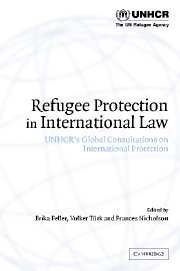Book contents
- Frontmatter
- Contents
- List of annexes
- Notes on contributors and editors
- Foreword
- Preface
- Acknowledgments
- Expert roundtables and topics under the ‘second track’ of the Global Consultations
- Table of cases
- Table of treaties and other international instruments
- List of abbreviations
- Part 1 Introduction
- Part 2 Non-refoulement (Article 33 of the 1951 Convention)
- Part 3 Illegal entry (Article 31)
- Part 4 Membership of a particular social group (Article 1A(2))
- Part 5 Gender-related persecution (Article 1A(2))
- Part 6 Internal protection/relocation/flight alternative
- Part 7 Exclusion (Article 1F)
- 7.1 Current issues in the application of the exclusion clauses
- 7.2 Summary Conclusions: exclusion from refugee status, expert roundtable, Lisbon, May 2001
- 7.3 List of participants
- Part 8 Cessation (Article 1C)
- Part 9 Family unity (Final Act, 1951 UN Conference)
- Part 10 Supervisory responsibility (Article 35)
- Index
7.1 - Current issues in the application of the exclusion clauses
Published online by Cambridge University Press: 28 August 2009
- Frontmatter
- Contents
- List of annexes
- Notes on contributors and editors
- Foreword
- Preface
- Acknowledgments
- Expert roundtables and topics under the ‘second track’ of the Global Consultations
- Table of cases
- Table of treaties and other international instruments
- List of abbreviations
- Part 1 Introduction
- Part 2 Non-refoulement (Article 33 of the 1951 Convention)
- Part 3 Illegal entry (Article 31)
- Part 4 Membership of a particular social group (Article 1A(2))
- Part 5 Gender-related persecution (Article 1A(2))
- Part 6 Internal protection/relocation/flight alternative
- Part 7 Exclusion (Article 1F)
- 7.1 Current issues in the application of the exclusion clauses
- 7.2 Summary Conclusions: exclusion from refugee status, expert roundtable, Lisbon, May 2001
- 7.3 List of participants
- Part 8 Cessation (Article 1C)
- Part 9 Family unity (Final Act, 1951 UN Conference)
- Part 10 Supervisory responsibility (Article 35)
- Index
Summary
Introduction
Those applicants found to fall within Article 1 F of the Convention Relating to the Status of Refugees 1951 are excluded from refugee status. Article 1 F provides:
The provisions of this Convention shall not apply to any person with respect to whom there are serious reasons for considering that:
(a) he has committed a crime against peace, a war crime, or a crime against humanity, as defined in the international instruments drawn up to make provision in respect of such crimes;
(b) he has committed a serious non-political crime outside the country of refuge prior to his admission to that country as a refugee;
(c) he has been guilty of acts contrary to the purposes and principles of the United Nations.
As a consequence, non-refoulement protection under Article 33 of the 1951 Convention is unavailable. In addition, however, a 1951 Convention refugee will lose protection from refoulement if he or she falls within paragraph 2 of Article 33:
1. No Contracting State shall expel or return (‘refouler’) a refugee in any manner whatsoever to the frontiers of territories where his life or freedom would be threatened on account of his race, religion, nationality, membership of a particular social group or political opinion.
2. The benefit of the present provision may not, however, be claimed by a refugee whom there are reasonable grounds for regarding as a danger to the security of the country in which he is, or who, having been convicted by a final judgment of a particularly serious crime, constitutes a danger to the community of that country.
- Type
- Chapter
- Information
- Refugee Protection in International LawUNHCR's Global Consultations on International Protection, pp. 425 - 478Publisher: Cambridge University PressPrint publication year: 2003
- 10
- Cited by



